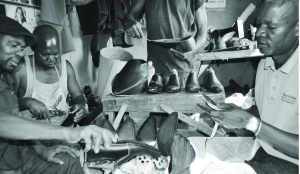By CHRISTINE MWAABA –
DESPITE having several challenges in raising capital or acquiring machinery, local hand-made shoe entrepreneurs have gone ahead to leave their footprint in the business.
The small-scale entrepreneurs have carved an enviable niche in the footwear industry largely through innovation and fierce determination.
This writer visited one such workshop and was impressed by the skill exhibited by the shoe-makers where they displayed their products on the shelves.
The shoe-makers were busy cutting pieces of leather, gluing soles and hammering away to ensure the final product met the specification of their customers.
The quartet David Mweemba, Webby Sipeso, Constatino Munyololo and Borniface Mudagalaba are all self-taught craftsmen who cut, design and make men’s shoes using simple material.
They have been making shoes which they sell either in bulk or for individual orders since 1990.
After one of the shoe architect Mr Webby Sipeso worked for ACTIZA Investment for a few months, he teamed up with his colleagues and started a hand making men’s shoe company in one of the shelters at Soweto market in Lusaka.
Webby, who is the proprietor of the business, and his colleagues have dedicated themselves fully in this new ambitious venture using simple and easily accessible machinery for their production.
“We bought the things we needed to use to make a finished shoe over to the shop and that is a sewing machine, brazier and the leather material,” says Webby.
He noted that there is not too much work involved when it comes to manufacturing shoes as any one can manage as long as they have the zeal and drive to do it.
He says as a small medium enterprise, they face a lot of challenges and would like to expand their business to meet the demand for locally made shoes.
“As Zambians, we should by now be depending on locally manufactured shoes because the production is not as complicated or as expensive as it seems,” he noted.
He said the challenge they face as an SME is that the materials they use are simply bought from the traders who buy the leather from countries like Tanzania.
He said besides the work space being small to allot their work station so that the shoes are cut, designed and crafted to a finished product, it also means that they are limited to the number of shoes they make in a day.
He said though the task is a meticulous one hampered by limited space, they cope to do a good job to ensure that the customers are satisfied with the final product.
“We design and make shoes akin to the ones from a shoe manufacturing industry because the formular they use in the industry is the same as ours”.
Webby adds that they make sure that the shoes are of good standard, eye catching, strong, and durable so the public can appreciate the locally made products in order to promote Zambian manufacturers.
“we want our customers to be asked where did you buy that?’ who made it? and surprise people that they were made locally,” he said.
Despite their shoes being hand made, they are comfortable, trendy and neat like any other shoes from big shoe factories.
“We are working hard to get more motivated employees in the production section. Finding a skilled and dedicated worker is hard, but we are optimistic that one day our business will grow into a big manufacturing company that will be supplying to a bigger Zambian populace,” he says.
He said their objective is to be a national player in shoe manufacturing in Zambia considering that there are very few companies that manufacture shoes locally.
With encouragement from authorities, SMEs engaged in businesses like shoe-making can increase employment and play a major role in Zambia’s economy in terms of job creation and income distribution.
SMEs are the bedrock that micro-enterprises thrive on.
The future of Zambia greatly lies on the leverage of SMEs because they contribute more in terms of economic development.
The unemployment crisis within Zambia can be tackled by expanding and investing in SMEs.







